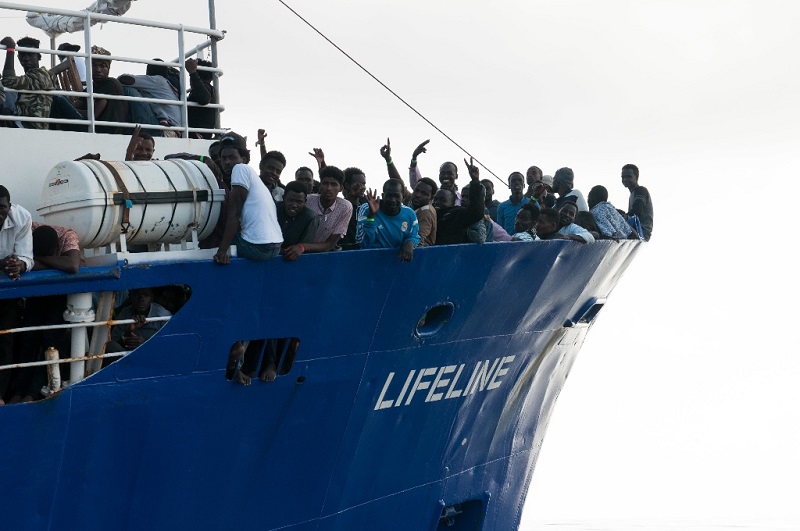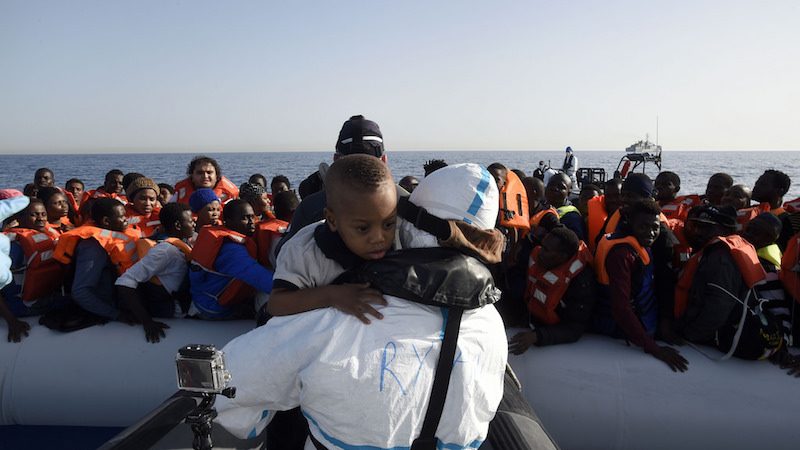The former director of the Maltese coast guard, Colonel Martin Cauchi Inglott, warned that “the sudden block of the migration flow is a short-sighted approach as one cannot sweep humanitarian considerations under the carpet.”
In an interview with independent online news European Interest, Cauchi Inglott said “Whilst I appreciate that many Europeans support the tough stance being taken by southern European countries vis-a-vis migration out of Libya, anyone with a conscience and foresight must ask what the consequences for those migrants returned to Libya?”
The retired military officer who also served as FRONTEX Mission Commander asked “Can Europe really expect the Libyan government to offer humane facilities for the thousands of migrants now stranded in Libya? How will Europe react once atrocities in Libya come to light, or pictures of the next capsized boat hit the press?”
Cauchi Inglott a retired senior EU naval officer who has a strong portfolio of international military achievements in diplomatic and operational positions is now a freelance security and defence consultant contracted by the United Nations and other international corporations and agencies.
“Whilst I feel that stemming the flow of economic migrants out of Libya should be the ultimate objective, the sudden block of the migration flow is a short-sighted approach as one cannot sweep humanitarian considerations under the carpet. That is because refugees eligible for international protection are amongst those migrants., And Libya is not a stable country and has yet to sign the Geneva Convention,” he said.
EU must seek solution with Libya
Stressing that “returning asylum seekers to Libya is, for now, not a viable option,” Cauchi Inglott however said that “a solution needs to be negotiated with Libya before the next migration season begins.”
Colonel Inglott: No migration crisis is ever about border control@#https://t.co/IJf6RA5JJa
— European Interest (@EuropeInterest) August 27, 2018
He warned that unless Europe sorts out its migration policy, smugglers will continue to find more innovative ways of ‘shipping’ migrants to Europe, through Libya or other countries, “with consequences for all, but first and foremost migrants who risk their lives.”
With over 1,500 people losing their lives at sea since the beginning of the year, Cauchi Inglott argued that the only way out of this quagmire is for the EU and Libya to devise comprehensive migration policies in tandem.
“The EU currently appears to be taking a rather disjointed approach as its conglomerate of semi-independent institutions and agencies are being guided by 28 Member States, each having their egoistic political interests at heart.”
However, he added, the EU can influence migration policy in Libya, by emulating the model adopted in Somalia in which “the EU combined its development, diplomatic and security instruments to provide comprehensive and synchronised solutions under the lead of an EU Special Representative – one lead!”
Asked what the solution is, Cauchi Inglott said the solution cannot be simply blocking migration on the border or controlling migration through rigorous screening.
“I contend that there should be middle of the road solutions where those who warrant international protection are welcomed into Europe, whilst economic migrants are dissuaded from voyaging to Europe. Those already in Libya should be repatriated following amicable negotiations until the EU sets up a long-term plan for migration from sub-Saharan Africa.”
Mixed feelings on NGOs
With Italy and Malta denying NGOs from carrying out rescue missions, Cauchi Inglott said he has mixed feelings about NGOs providing humanitarian assistance to migrants.

Malta and Italy are impeding NGOs from saving lives at sea – Photo: Mission Lifeline / Hermine Poschmann
“On the one hand, there is the indisputable fact that NGO vessels are doing an outstanding job in saving lives, bringing refugees which warrant protection to Europe. But the logical thing for any NGO vessel to do is to lay off Libyan territorial seas (24 miles offshore for migration) and switch on its transponder (Automatic Identification System), making the vessel’s location visible on smugglers smartphones. That sadly allows smugglers to plan for a vessel that is seaworthy for 24 miles, rather than something strong enough to cross the Mediterranean. That is probably why we frequently see migrant cadavers being washed up on Libyan shores.”
While insisting that he never witnessed any collusion between NGOs and criminal networks, he asked whether NGO vessels are potentially luring more sub-Saharan African migrants to Europe and whether they are in the process risking people’s lives.
Minimal cooperation between Malta and Italy
In recent weeks Malta and Italy have constantly bickered over who is responsible for the rescue of migrants at sea.
Asked to what extent is Malta dependent on cooperation with Italy for the management of migration flows, Cauchi Inglott said from his interpretation of current events there is minimal cooperation between Italy and Malta on migration on the political front.
Pointing out that standoffs “appear to be the order of the day when migrants vessels are beyond the reach of the Libyan Coast Guard” he said both Italy and Malta are abiding by their interpretation of international law.
Explaining that the Maltese government rejected the 2004 amendments to the Search and Rescue Convention “because it was clearly not in Malta’s interest to do so” he said Malta abides by the principle that migrants should be disembarked in the closest safe haven, which Cauchi Inglott believe is the logical course of action for any rescue case.













